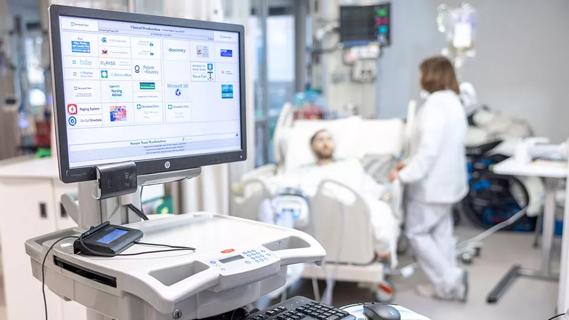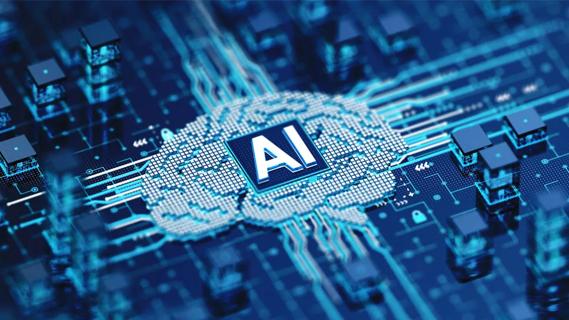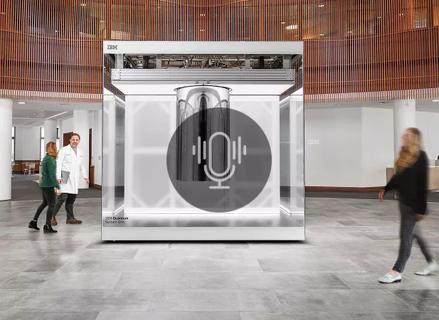Neurology is especially well positioned for opportunities to enhance clinical care and medical training
Podcast content: This podcast is available to listen to online.
Listen to podcast online (https://www.buzzsprout.com/2243576/14531597)
John Morren, MD, believes that neurologists can be change agents for artificial intelligence (AI) in medicine.
Advertisement
Cleveland Clinic is a non-profit academic medical center. Advertising on our site helps support our mission. We do not endorse non-Cleveland Clinic products or services. Policy
“We should be owning this a lot more than we do because the engineers who are building AI models are looking at the object of our passion, the nervous system, and using it to add power to these computer systems,” says Dr. Morren, a neurologist in Cleveland Clinic’s Neuromuscular Center.
In the latest episode of Cleveland Clinic’s Neuro Pathways podcast, Dr. Morren, who serves on the board of directors of the American Association of Neuromuscular and Electrodiagnostic Medicine and leads its AI task force, shares his thoughts on the intersection of AI and neuroscience. He discusses the following:
Click the podcast player above to listen to the 29-minute episode now, or read on for a short edited excerpt. Check out more Neuro Pathways episodes at clevelandclinic.org/neuropodcast or wherever you get your podcasts.
This activity has been approved for AMA PRA Category 1 Credit™ and ANCC contact hours. After listening to the podcast, you can claim your credit here.
Podcast host Glen Stevens, DO, PhD: How is AI going to help us in clinical care?
Dr. Morren: I think most of the audience, when they think of AI, they think of ChatGPT and similar large language models [LLMs] like Google's Bard [now called Gemini] or Claude AI or Microsoft’s Bing AI with Copilot. These are all free, web-based LLM applications that are hugely popular, and AI has really shot into the public consciousness after the release of ChatGPT in the fall of 2022.
Advertisement
But for clinical care, there’s actually an equivalent to ChatGPT for clinicians, and that’s called Med-PaLM, which is a product from Google. And now Med-PaLM 2 is out, and some folks may have heard about how it has performed way above 80% in the USMLE [United States Medical Licensing Examination®] and similar medical exams. And there are similar LLM-type AI technologies being used.
Even in radiology, there's something called Annalise.ai, and you could go and put in your brain CT and have this software read it for you and see how it performs. It does a decent job. It’s really exciting, but, again, its purpose is to augment, not replace, radiologists. Isaac Kohane at Harvard talks about how he even uses ChatGPT responsibly to crack some hard diagnostic cases. I would certainly encourage folks to read his book, The AI Revolution in Medicine.
There is a lot of work in medical scribing, such as DeepScribe and Dragon DAX and Augmedix. They use ambient AI technology. This means we can probably get our notes done accurately and quickly, liberating ourselves from the keyboard and the computer screen so we can spend some more meaningful time with our patients.
And then you can use AI for a number of administrative purposes in the medical office, using something called Consensus, which we could talk more about. You can use it to optimize your patient portal messages to make sure that you're speaking to patients at a grade 6 or 7 reading level, as the NIH recommends, for medical explanations.
Advertisement
Even here for clinical care, we’re doing a lot with an AI in Medicine grant here in the Neuromuscular Center to improve things like EMG. As you would imagine, patients have been asking for a long time, “How can we use technology to lessen the pain and the discomfort that comes with needle electrode examination?” And I think this is going to be a big part of how we really revolutionize that.
Advertisement
Advertisement

Advanced software streamlines charting, supports deeper patient connections

Cleveland Clinic uses data to drive its AI implementation strategy

Cleveland Clinic and IBM leaders share insights, concerns, optimism about impacts

Customized bots improve speed, efficiency by streamlining daily clinical, clerical tasks

Cleveland Clinic neuromuscular specialist shares insights on AI in his field and beyond

How technology is changing how and whom we hire

How a Cleveland Clinic/IBM quantum computer partnership aims to hasten discoveries

Discovery Accelerator Partnership with IBM Deploys Advanced Computing Technologies to Supercharge Healthcare Research